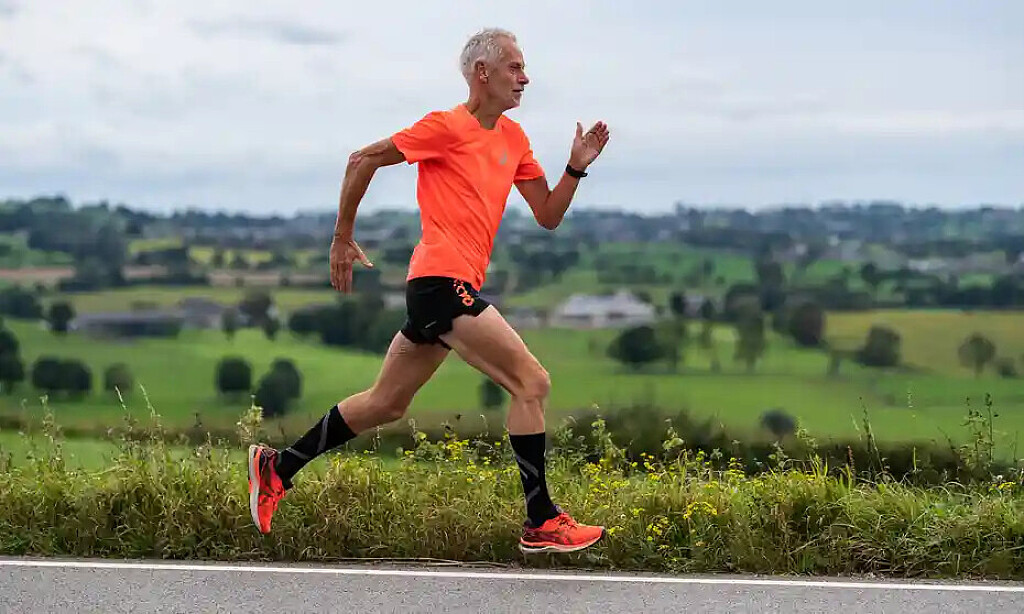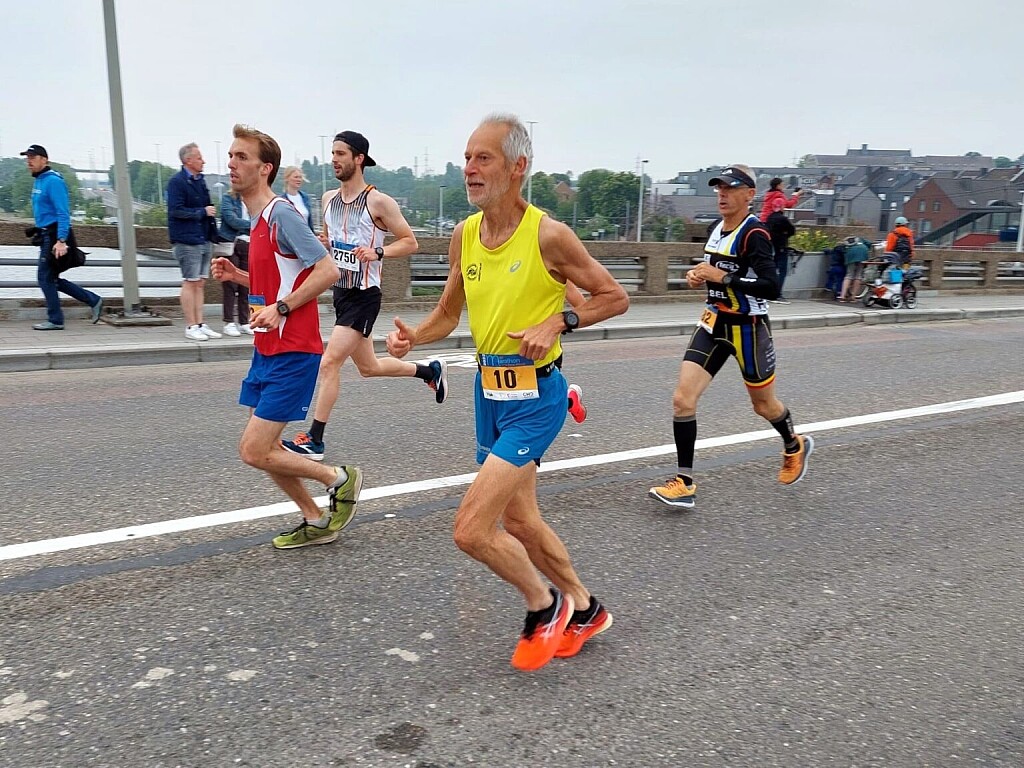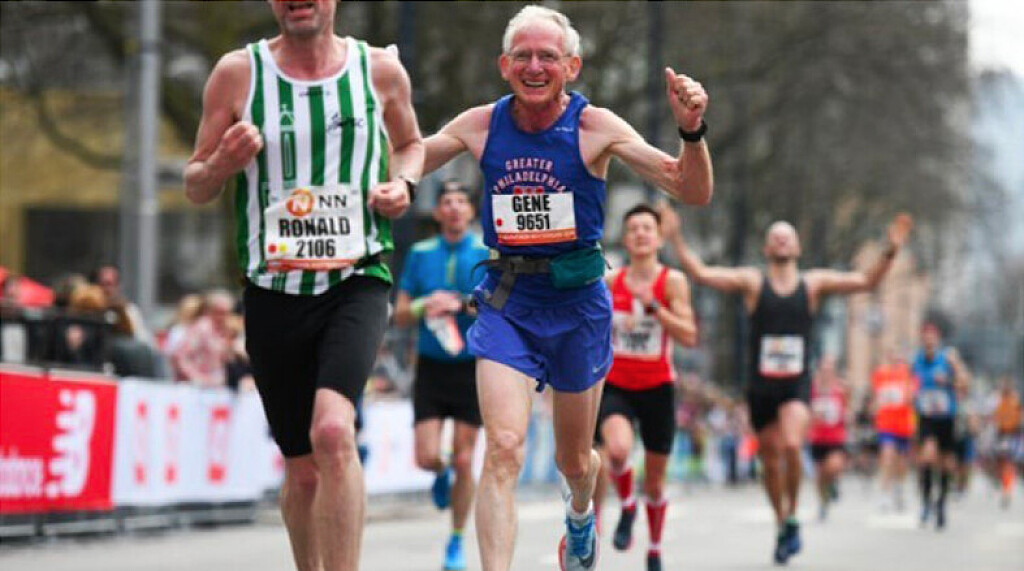Running News Daily
Running News Daily is edited by Bob Anderson. Send your news items to bob@mybestruns.com Advertising opportunities available. Train the Kenyan Way at KATA Kenya and Portugal owned and operated by Bob Anderson. Be sure to catch our movie A Long Run the movie KATA Running Camps and KATA Potato Farms - 31 now open in Kenya! https://kata.ke/
Index to Daily Posts · Sign Up For Updates · Run The World Feed
Articles tagged #Jo Schoonbroodt
Today's Running News
How Jo Schoonbroodt smashed the world 70 plus marathon record
At an age where many of his contemporaries are winding down, the man they call the Grey Kenyan is somehow speeding up. On Sunday Jo Schoonbroodt, a 71-year-old from Maastricht, ran a marathon in a staggering 2hr 54min 19sec to become the fastest septuagenarian in history.
A few days later, when the Guardian catches up with him, his achievement is still sinking in. “I only started jogging at 36 because my doctor told me I had high cholesterol,” he says, chuckling. “But last year I ran 7,242 kilometres [4,450 miles], which is more than double what I did in my car.”
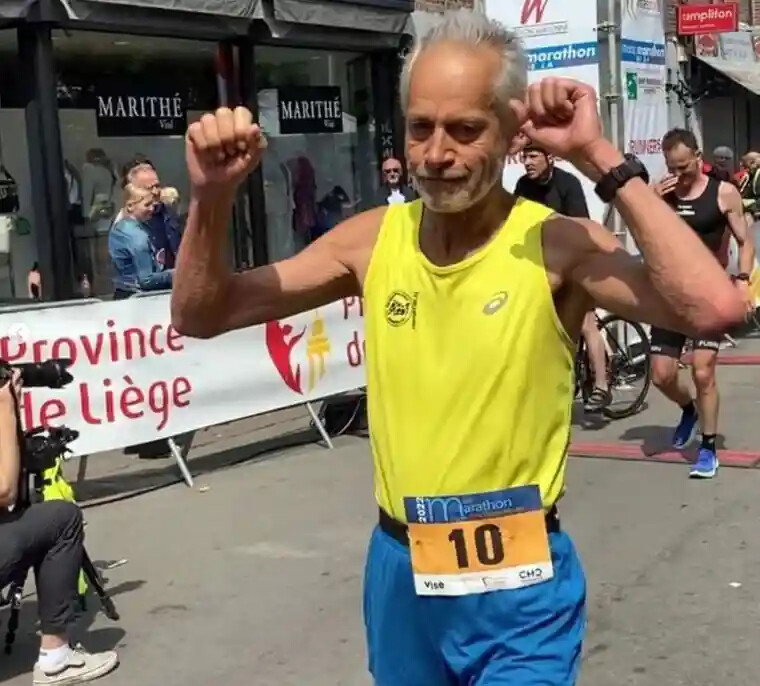
It also turns out that Schoonbroodt’s new 70+ world record, set at the Maasmarathon of Visé in Belgium, was inspired partly by an unlikely source: the Flemish crooner Eddy Wally. With a few miles remaining, he knew he was just ahead of the previous best, set by Gene Dyckes in 2018, because a friend was following him on his bike and barking out his lap times. But his legs were starting to get heavier.
“However, my friend had a special trick to keep me on track,” says Schoonbroodt, who was wearing a yellow and blue kit in support of Ukraine. “He picked up his phone and put Eddy Wally’s song Chérie, Chérie on repeat. I’ve always loved it, I don’t know why. It gave me a boost in morale. I overtook one runner after another and, despite getting cramp in the final 500m, I was able to break the record by four seconds.”
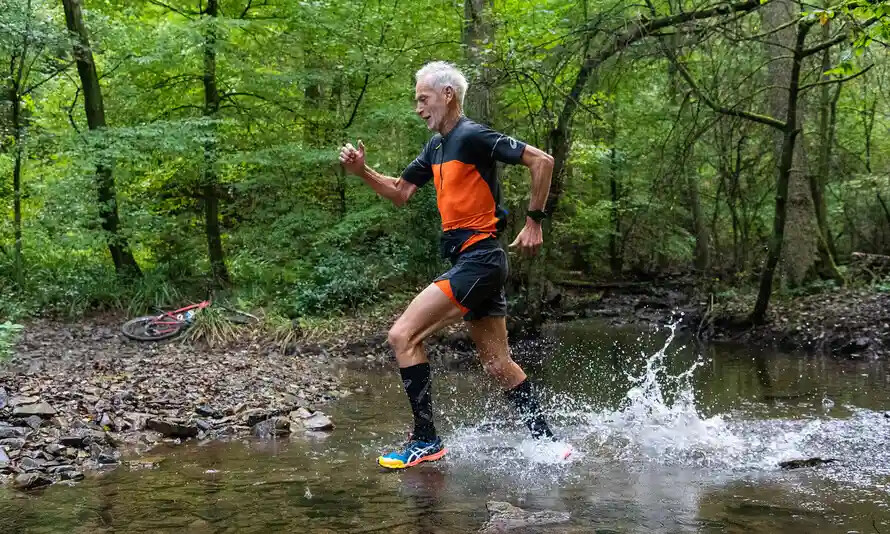
Incredibly it was Schoonbroodt’s 75th sub-three-hour marathon, and it came only four weeks after his 74th at the Rotterdam marathon. For good measure, the flying Dutchman also holds a number of ultra running records. He is clearly no ordinary Jo. But the secrets of his success might surprise you.
“Most runners train too hard. I do a lot of my training with groups who run very slowly. And then I build on these basics with some faster interval training. But I don’t do the same stupid distance 10 or 20 times – I prefer to have a lot of fun with my running.”
Schoonbroodt often runs at nine- or 10-minute mile pace, far slower than the 6:38min miles he ran for 26.2 miles to set his world record, but he says the crucial thing is he listens to his body. “A lot of people follow a training plan or coach and push on even when their body is saying: ‘No, this is not a good day to do it.’ But if you go out the door and just do what you feel, it’s easier to keep running and stay injury-free.”
He also dismisses the idea that runners need to do anything special with their diets. “Diet? No, no,” he scoffs. “No diet! I eat double portions, of course, with all these calories I burn. I love pasta and potatoes. But whatever is on the table, I eat it.”
He has a similarly relaxed attitude when it comes to alcohol. “I prefer the French wine and the Belgian beer. Not too much, and mostly on weekends. Wine is just a grape drink, so it’s made from nature. And Belgian beer is special. And if you do all this with your body,” he adds, referring to the 85 miles he still runs each week, “you need to give it something back. And this is what I give back to the body!”
Schoonbrot is a former IT worker and can tell the exact day he started running – 1 January 1986 – and how many kilometres – 120,000 – he has done since. But he stresses he was no natural. At first people called him Jogger Jo, because he was slow. Nowadays he gets called the Grey Kenyan – a nickname given to him years ago by a race announcer as he blasted past athletes a third of his age.
Being a late bloomer, he believes, has actually helped him because his ego never had to worry about chasing faster times of his youth. “Because I started so late, I missed my best years. But that’s no problem. Everything is still new to me.”
Schoonbroodt also cites the new range of carbon-plated “super shoes”, which have swept the running world over the past five years, as a key factor. On Sunday he ran in the Asics Metapeed Sky, and has been an ambassador for the Japanese company for the past four years, preaching the positive benefits of exercise to sceptics and lapsed practitioners.
But while Schoonbrodt’s achievements are exceptional, he is not the only old master to defy conventional wisdom. Several men older than 70 have run a sub-three-hour marathon – the first of whom, Ed Whitlock, who died in 2017, also ran a 3:15 marathon after turning 80.
So what might explain this phenomenon? John Brewer, a sports scientist at the University of the West of Scotland, points out that while we experience a 10% decline in muscle mass every decade as we age, the decline isn’t as sharp for endurance. “The scientific evidence shows that you can maintain your aerobic capacity – your Vo2 max – very effectively into old age,” he says.
“And if you look at where we are now compared to 40 years ago, the advances in nutrition, sports science, recovery and technology, all mean that it is more feasible for people in their 60s and 70s to produce good performance if they follow the right training.”
Brewer, who was also part of England’s backroom staff for the 1990 World Cup, says Schoonbrodt’s story carries another message – that it is never too late. “People think they can’t turn it around after years of no exercise or poor diets,” he says. “Well, actually you can.”
Schoonbroodt, meanwhile, has no plans to put his feet up. “My next marathon is in two and a half weeks, on an old Roman road built 2,000 years ago,” he says, the excitement obvious. It will be his fifth in 2022. And with that he is off. After all, the quest for a 76th sub-three-hour marathon waits for no man. Not even one who is 71.
by Sean Ingle (The Guardian)
Login to leave a comment
Maas Marathon De La Basse-Meuse
Ever since the initial steps, in 1999, all the organizers, the towns, cities and municipalities involved in this 26.2 mile challenge have constantly been expressing their delight at their investment. Over the years, we have noticed the marathon participants looking for races that are able to offer an extra and original dimension in terms of the circuit and activities. We...
more...71-year-old Jo Schoonbroodt ran 2:54:19 at Maasmarathon in Belgium to break the M70+ world record by 29 seconds
Over the weekend (May 8, 2022) at the Maasmarathon of Visé in Belboom, Belgium, Jo Schoonbroodt of the Netherlands broke Ed Whitlock’s M70+ marathon world record of 2:54:48 by 29 seconds. Schoonbroodt ran 2:54:19 to win the men’s 70-74 age category (by an hour and a half) and also set the M70+ world record.
Schoonbroodt set out with the a goal of running under three hours to complete the 75th marathon he has run under the three-hour barrier, but he had a slight tailwind in the first half of the course, covering it in 1:26:18. The second half was into the wind, but Schoonbroodt tucked in behind another runner to help mitigate the effect.
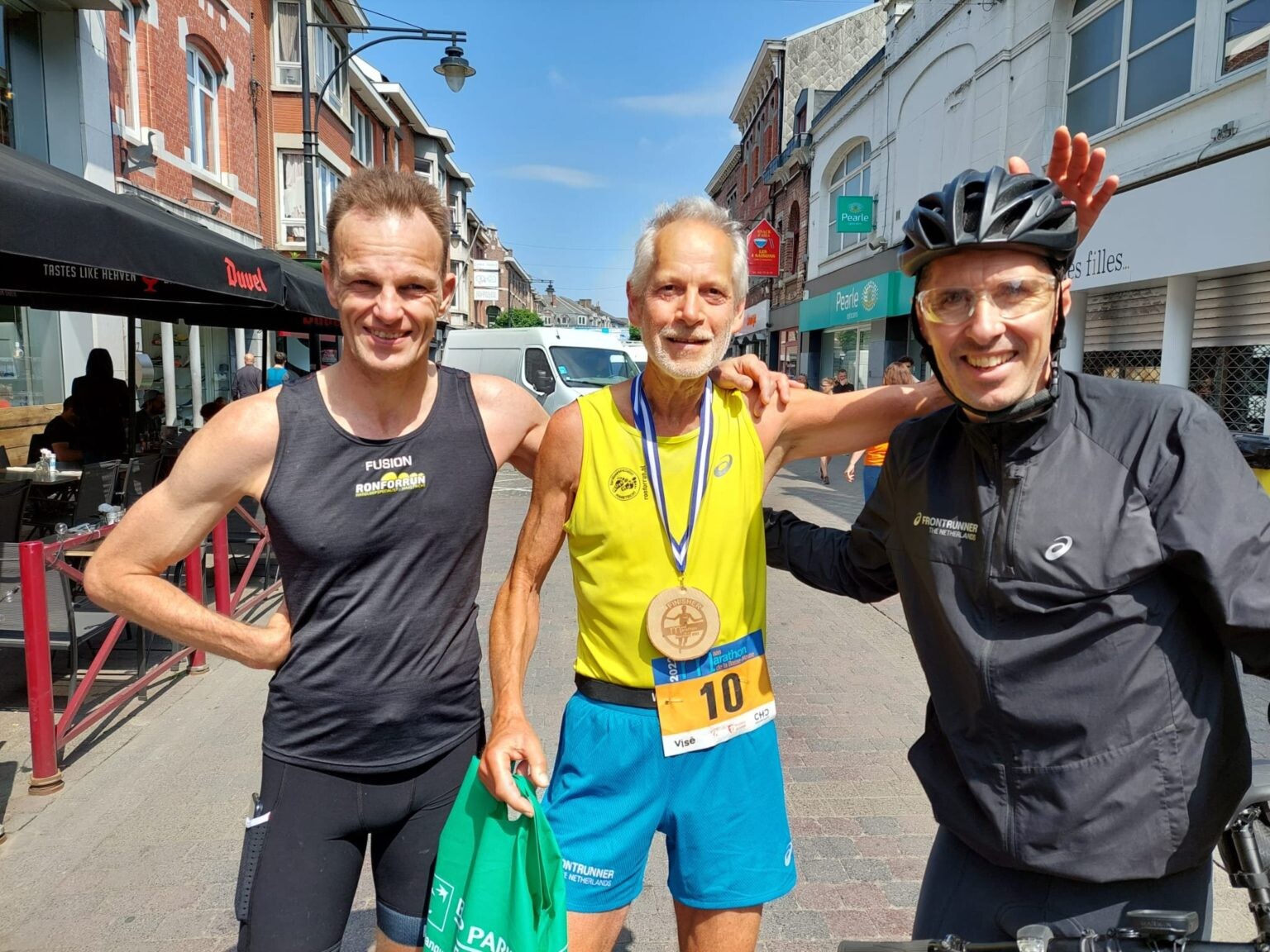
His time not only beat Whitlock’s official record of 2:54:48, but also U.S. masters runner Gene Dykes unofficial record time of 2:54:23 by four seconds; Dykes ran this time at the Jacksonville Marathon in 2018, only to discover the course was not sanctioned by USATF.
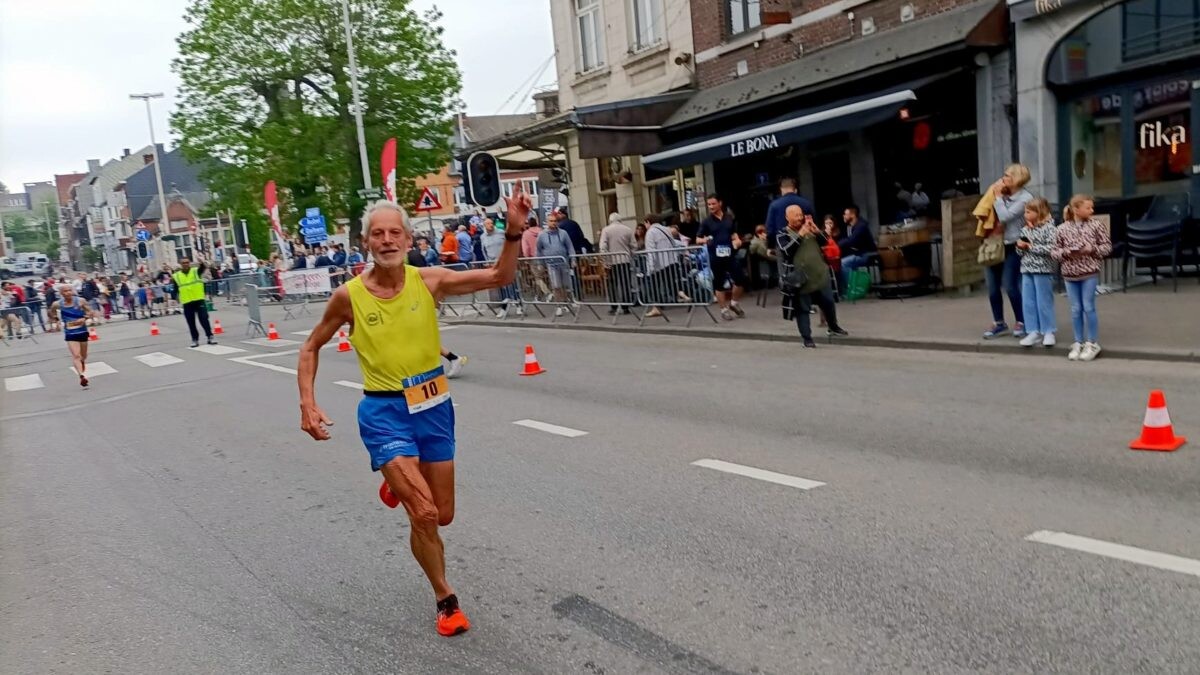
We reached Dykes for a comment: “I’ve been watching with anticipation for Jo to break the record!” he told us in a Facebook message. “My odds of retaking the lead this fall are extremely long–I’m looking forward to tussling with Ed at M75 next year. It would appear that Jacob Nuris going to wipe out the M70 records three years from now.”
According to Strava, Nur is a runner from Elk Grove, Calif. He is 66. And according to USATF, he broke the M65-69 American record in the 10K in November in Sacramento (35:42), as well as the 10-mile American record in 59:11 at the NorCal John Frank Memorial 10-Mile in March.
Schoonbroodt said on his Instagram page that he was not fixated on breaking the record before the race. “A time under three hours was my goal, but I am now happy I can call myself the fastest 70+ runner on the planet.”
This record is not Schoonbroodt’s first, as the Maastrict, Netherlands, resident ran the M60+ six-hour world record in 2012, covering almost 79 kilometres. “I have always been inspired to run by others,” Schoonbroodt says. “Hopefully this record inspires others around my age to start running.”
When the 71-year-old marathoner isn’t running, he is usually playing with his grandkids or hiking in the Dutch countryside. According to his website, he likes to live according to the motto of enjoying every day and being present in the moment.
by Running Magazine
Login to leave a comment
Maas Marathon De La Basse-Meuse
Ever since the initial steps, in 1999, all the organizers, the towns, cities and municipalities involved in this 26.2 mile challenge have constantly been expressing their delight at their investment. Over the years, we have noticed the marathon participants looking for races that are able to offer an extra and original dimension in terms of the circuit and activities. We...
more...How Gene Dykes Became the World's Fastest 70-Year-Old
Gene Dykes is a heck of an athlete. In his serious bowling days, he four times rolled a perfect score (300). On the golf course, he has recorded a best round of 68 on a par 70 layout. And a little less than three years ago, Dykes ran the fastest time ever by a 70-year-old in a certified, out-and-back marathon (2:54:23 in December 2018).
What's he been up to since that marathon record? Quite a bit, especially when you consider his prolific race and ultramarathon schedule. But a bit less than planned, given a broken shoulder in 2019 (trail run fall), Covid restrictions in 2020, and a hamstring injury from August this year.
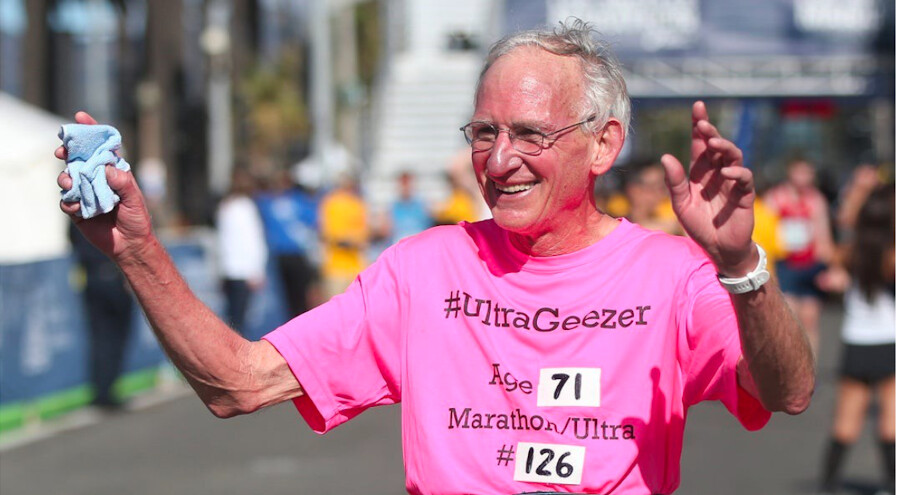
Dykes, now 73, had hoped for peak 2021 races to come at the WADA WMM Age Group Championships in London in early October, followed 8 days later by a fifth consecutive in person, age-group win at Boston. His hamstrings didn't cooperate, however. He had strained them in August at the Hood To Coast Relay.
As late as 24 hours before London, Dykes figured he wouldn't run. But he's irrepressible when it comes to starting lines, so he was there the next morning, and eventually hobbled and walked to the finish in 5:37:56.
At Boston, he hoped to continue his four-year age-group victory streak (65-69 victories in 2016 and 2017, 70-74 in 2018 and 2019). His legs felt a bit better, so he decided to aim for 3:30 pace, which he calculated would give him a 50/50 chance of winning his age group.
His math proved remarkably good, but he ended up on the short end of the 50/50. Dykes hit the tape in 3:30:02, just 28 seconds slower than Mike Wien's first-place 3:29:34.
"If I had known I needed 30 seconds, I could certainly have found them in the last 5 miles," Dykes says.
Other 70-somethings have broken 3 hours in the last month, including Jo Schoonbroodt in Amsterdam (2:56:37) and Michael Sheridan in London (2:59:37). Dykes will turn 74 next April. If he wants to remain atop his age-group, he'll face serious competition for the first time.
To get ready, and to heal an ailing body, Dykes plans a full month of no running from mid-November to mid-December. He and his wife will be cruising the waters around Antarctica and chasing a solar eclipse. He hopes to return to competition at the Naples (FL) Half Marathon in January.
Here, Dykes answers questions about his remarkable past three years of running and what he has learned along the way. His coach, John Goldthorp, adds more information about Dykes's training routine.
Q &A with Gene Dykes
Why did you run London and Boston if you were injured?
Before London, my coach didn't want me to run, my family didn't want me to run, my wife didn't want me to run, but I felt like my Facebook friends were all saying: "Run, run, run." I thought I'd drop out after 6 or 7 miles, but I kept going even though my hamstrings wouldn't allow anything under 10:15 pace. Then I didn't run a lick before Boston, but I could tell that my legs were a little better.
You were already running strong in your mid-60s when you hired a coach for the first time. How did that change things?
It was like night and day. I was a 3:29 marathon runner before, and six months later I ran 3:09 at Boston. When I coached myself, I pretty much ran all long, slow miles with occasional 800-meter repeats on the track. If I was sore after a workout, I figured it was best for old guys like me to rest. John had me out there working my ass off 6 days a week. Sure, a couple of those were recovery runs, but he had me doing lots of miles about a minute per mile faster than before.
I found that when a coach set expectations for me, there was no way I wasn't going to suffer to get the workout done. Needless to say, I discovered I had much more ability locked away than I had realized. I only needed the expertise and accountability that a coach provides.
I've read that you were mostly running around 45 to 50 miles a week. That seems low for your fast race times.
That's the trouble with averages. They hide a lot of variation. I ran close to 2800 miles in 2016, 2017, and 2018, which comes out to about 53 miles a week. But I did so many ultra-marathon races, that my training average was probably 45 to 50. When peaking for a specific, important marathon, I was in the low- to mid-60s.
You run a lot of ultras, and also race frequently. Is that to build endurance first, and then speed?
I'll probably never have another year like 2018. I ran 43 races that year. Hey, only seven of those were ultras! Because I raced almost every weekend, the race substituted for one of the week's harder speed workouts, yes, but I also trained pretty hard between races.
This year is instructive: You dropped out of a 256-mile trail race, ran a world best for 50K, did a road mile, then a 100-mile, then won three track races at USATF Masters, then jumped into Hood to Coast in late August. And these were only a few of your races in 2021. My question is: Is this a racing plan or a kid running amok in a candy store?
I guess there really is no grand plan most of the time. Every November I go through the list of races that pique my interest, either for fun or competition, and pencil the most important ones into the calendar. So many races, so little time! The most fun I have is when I'm running a long distance on trails. Even though I hate the 5K and shorter, any race is fun. Once upon a time, I figured that I would perform better if I didn't race so often. But in 2018, I raced 16 straight weeks and got faster every week. So why not go with it?
If 2021 had gone perfectly, what would have been your realistic goals at London and Boston?
At the beginning of the year, the dream was to set a world record at London and win at Boston. So, timewise, that would have been a 2:54 and, say, 3:07. As it turned out, absolutely nothing about that was realistic. After a 2020 filled with injuries and no races, I was off my game from the get-go in 2021. I realized pretty early that I wouldn't be setting a record in London, but I still thought I could win both London and Boston, at least until the hamstring injury.
What have you learned about yourself and running since your big year in 2018?
Don't run a bunch of fast legs at Hood to Coast on a body that's already tired! Otherwise, I'm not absolutely sure I've learned anything yet. I have some theories that I'll test out next year. I'll probably give myself more recovery time after ultras, and maybe stop doing the 200-milers. I might race less often, but I'm hoping I can still perform well at road races week after week.
Maybe I've learned two things: 1) Injuries are weird; and 2) Maurten is a game-changer for me.
What makes injuries so weird is you don't know when you're going to get one, or when it will get better. Every injury is different. Some only hurt when you run, and some don't hurt when you run, but they hurt around the house and yard. Some go away in a couple of days, but are suddenly replaced by others. You never know what's coming next.
Hamstring injuries really worry me. This is my third. The first one kept me from running for six years! The second knocked me out for six months. I'm hoping that this one is only six weeks (and the fourth one only six days).
Maurten has become an absolutely essential fuel for me in long races. It's more important than carbon shoes. It lets me get in more calories than ever before, and it eliminates nausea. When I'm feeling fatigued in a long effort, and then get some Maurten, my body feels happy again. [Note: Dykes has filmed a promotional video for Maurten, and might become a sponsored athlete.]
Have you changed your training over the years?
I don't think much about my training, I just do what my coach tells me.
What's in your future?
Sometimes I think I should just retire from trying to beat records. Maybe I should just have fun, and to hell with what everybody else thinks. I did set out to beat the marathon record in 2018, but I didn't do it for the attention. I just needed a good goal to motivate me for a couple of years.
I'll probably try to get back in shape and run fast next year. Then in 2023 when I'm 75, I'll try to repeat what I did in 2018. I'll prioritize whatever age-group records I think I can get, and the big championship races.
ohn Goldthorp answers questions about Gene Dykes's training
What kinds of workouts seem to work best for Gene? Which don't?
Every athlete is an N=1. Gene is fond of 'general aerobic' runs that are 60 to 90 seconds slower than his current 5K race pace, and he certainly loves long runs. Often we combine stamina training and short hills to make a longer session. We can tick off a lot of boxes in one day that way. Then he jogs very slowly the next day to recover.
Gene does so many ultras and other races, what role does recovery play in his training plan?
It's true that older athletes may need more time to recover, but sometimes a 70-year-old retiree can recover faster than a busy professional with young children. My marathoners aim for 2 harder workouts per week with everything else being very easy. Gene tends to run 5 to 6 days a week, depending on his gardening and golfing plans.
What about paces for intervals, tempo, long runs, etc.?
I prefer to help my athletes train by perceived effort instead of pace. Gene is unique in his ability to run marathons at a pace only about 35-40 seconds per mile slower than his 5K pace, where others are often 50 or 60 or more seconds slower. So we target many of our hard workouts close to his marathon effort. Gene's very good at not forcing things. Early in a workout, he's often convinced he won't be able to complete the planned session. But as he warms up, he usually finds that he can.
Anything else?
Gene's a master at listening to his body and doesn't hesitate to take a day off if necessary. On the other hand, I can't tell you how many times I gave him a light session only to learn later that he felt good and went out for a 23-miler instead.
How about Gene's racing schedule?
To say Gene's racing schedule is unorthodox would be putting it mildly. In 2017, he ran three 200-milers in three months and often raced the other weekends. But maybe this has contributed to his success. Running ultramarathons early in a training block allows him to develop tremendous endurance. Then, for about 8 weeks, he'll use shorter races and faster long runs to develop his threshold and efficiency.
I assume Gene's racing doesn't fit your ideal. How do you keep him under control?
At the end of the day, we have one life and we need to do what brings us joy. Gene loves going on adventures, challenging himself, and seeing the world via running. He's made a lot of friends and inspired a lot of people. If I were to say, "No, you must stick to one way of training and racing," I wouldn't be taking a client-centered approach to coaching.
I'm here to support Gene's journey. Sometimes that means getting out of his way. Other times, I try to gently nudge him back onto the path.
by Trail Runner Magazine
Login to leave a comment


